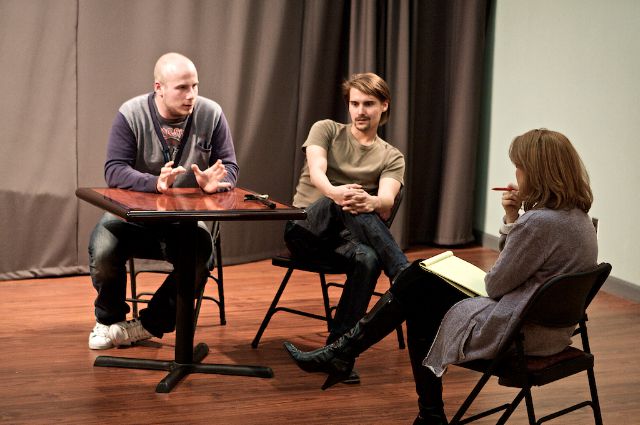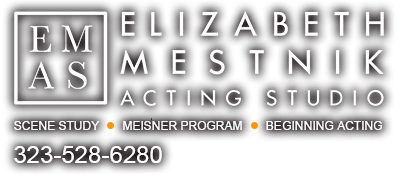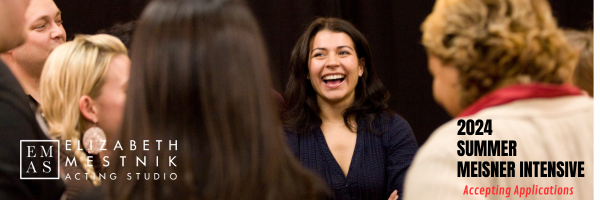
There are actually 2 phases of audition preparation. The first is what you do BEFORE you get to the audition and the 2nd is what you do in the waiting room once you are AT the audition.
When Emmy winning Casting director April Webster is asked what tips she has for actors auditioning for her, her first response is “Have your preparation done.” What does that mean? If you don’t know… then you might not be ready to be out there auditioning with the big boys. Get into a class and develop a technique and a process. But if you need a reminder – a process or ritual to follow for each audition – here’s a little checklist:
PHASE 1
When you get the script:
- Read the audition sides multiple times.
- Research the show (read the entire script (if film or theater) if possible, watch episodes of the show (if for TV) to understand the tone and genre.
- Make any character choices that are necessary – however, most of the time the character will be pretty close to who you are – that’s why they are bringing you in. .. make sure you honor any physical, vocal or psychological differences to your own natural state. Practice with those from the beginning! (ie: if the character is drunk – rehearse her drunk from the get-go)
- All the basics – where are you, what’s your relationship, where are you emotionally at the top of the scene etc. This is really your opportunity to do a short performance for the Casting Director – I found that thinking of it as a performance helped with nerves.
- Memorize as best you can, and get comfortable auditioning with the script in hand.
Night before:
- Decide what you are going to wear – make sure it fits, it’s ironed, that you can move in it etc. Do NOT dress as the character but make sure you dress appropriately for the character. For example, do not audition for a prisoner in a tie.
- Find out how to get to the audition (don’t rely only on your GPS the day of – they aren’t always correct), where to park etc…
- Pack easy snacks and plenty of water. Auditions infamously run late – and you want to sustain your energy.
- Pack your script and extra headshots and resumes.
- Schedule something to do right after the audition – so you can move on and not ruminate on what you could have done differently.
PHASE 2
At the Audition
- Before you leave your home, make sure you have warmed up physically and vocally.
- DO NOT LOOK AT YOUR PHONE. Once you are in the waiting room – don’t look at it – turn it completely off. Screen time takes you away from being present. There are studies that show that the auditory receptors in the brain start to disengage when all the information is being brought in through the eyes and that it can take up to 30 minutes for your listening abilities to return to normal.
- Don’t change your crafting in the waiting room. This isn’t the time to second guess what you have worked on – it’s the time to commit fully to your choices.
- Don’t “chit chat” with the other actors. Be friendly but stay away from small talk. It may be disruptive to other actors and might hurt your focus.
- Stay loose and be present. Mindfulness is really helpful at these times!
- While waiting, use your imagination to build the world and environment of the scene. Get emotionally available to the triggers of the scene. This is more important than running the lines in your head another 10 times. The CD wants to know that you can act – not that you can memorize.
- If the audition is for something small– treat it as such, stay light, and relaxed – no CD wants to see someone brooding over an audition for a one liner. Just be yourself.
- Smile and show ‘em what you got!
 Elizabeth Mestnik is an award winning, actress, director and teacher. Elizabeth founded EMAS to bring her New York style of professional actor training to the west coast. -She received her MFA in Acting from Rutgers University under the tutelage of William Esper, Sandy Meisner’s associate at the Neighborhood Playhouse for over 17 years, and New York’s leading Meisner teacher.
Elizabeth Mestnik is an award winning, actress, director and teacher. Elizabeth founded EMAS to bring her New York style of professional actor training to the west coast. -She received her MFA in Acting from Rutgers University under the tutelage of William Esper, Sandy Meisner’s associate at the Neighborhood Playhouse for over 17 years, and New York’s leading Meisner teacher.









